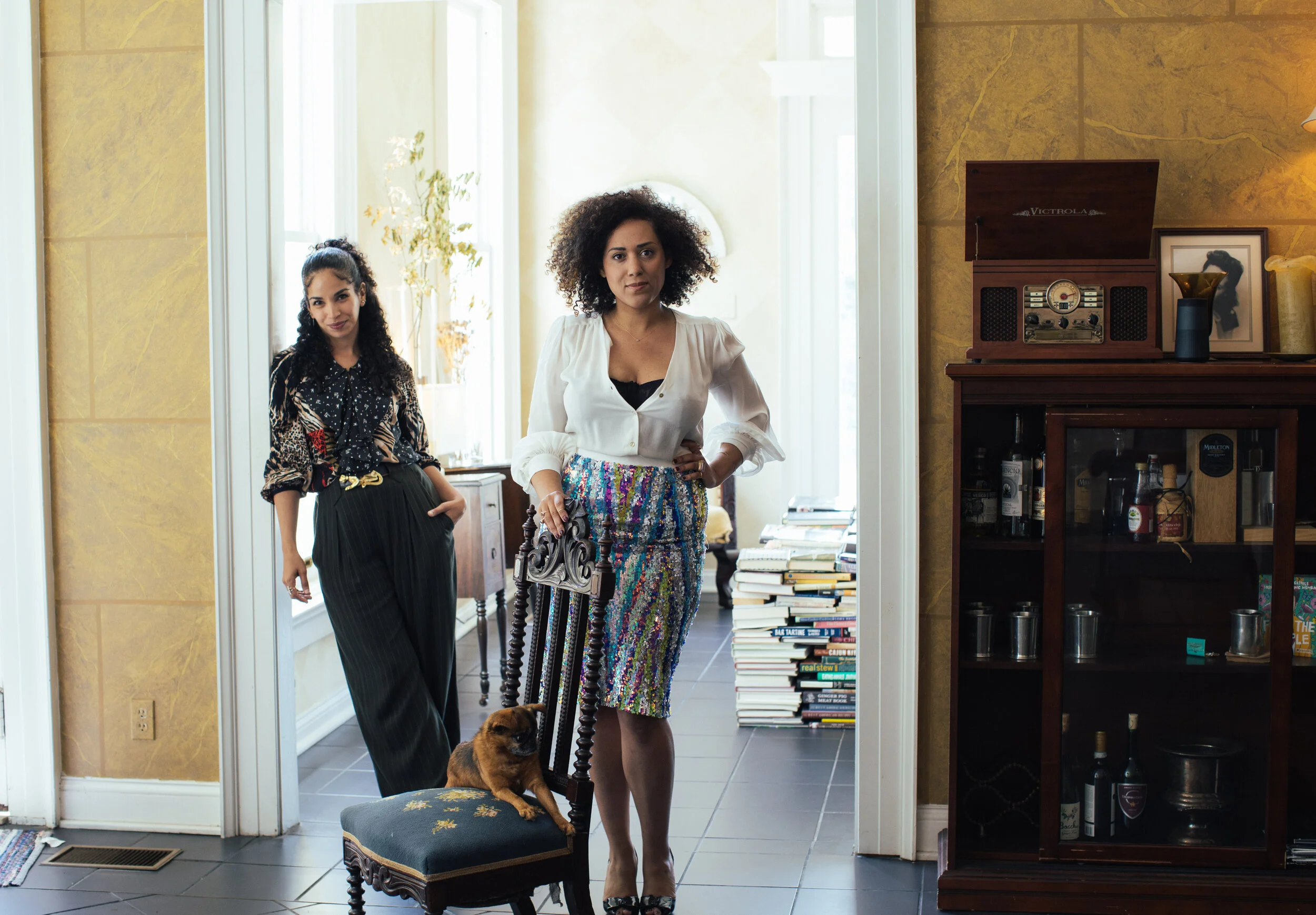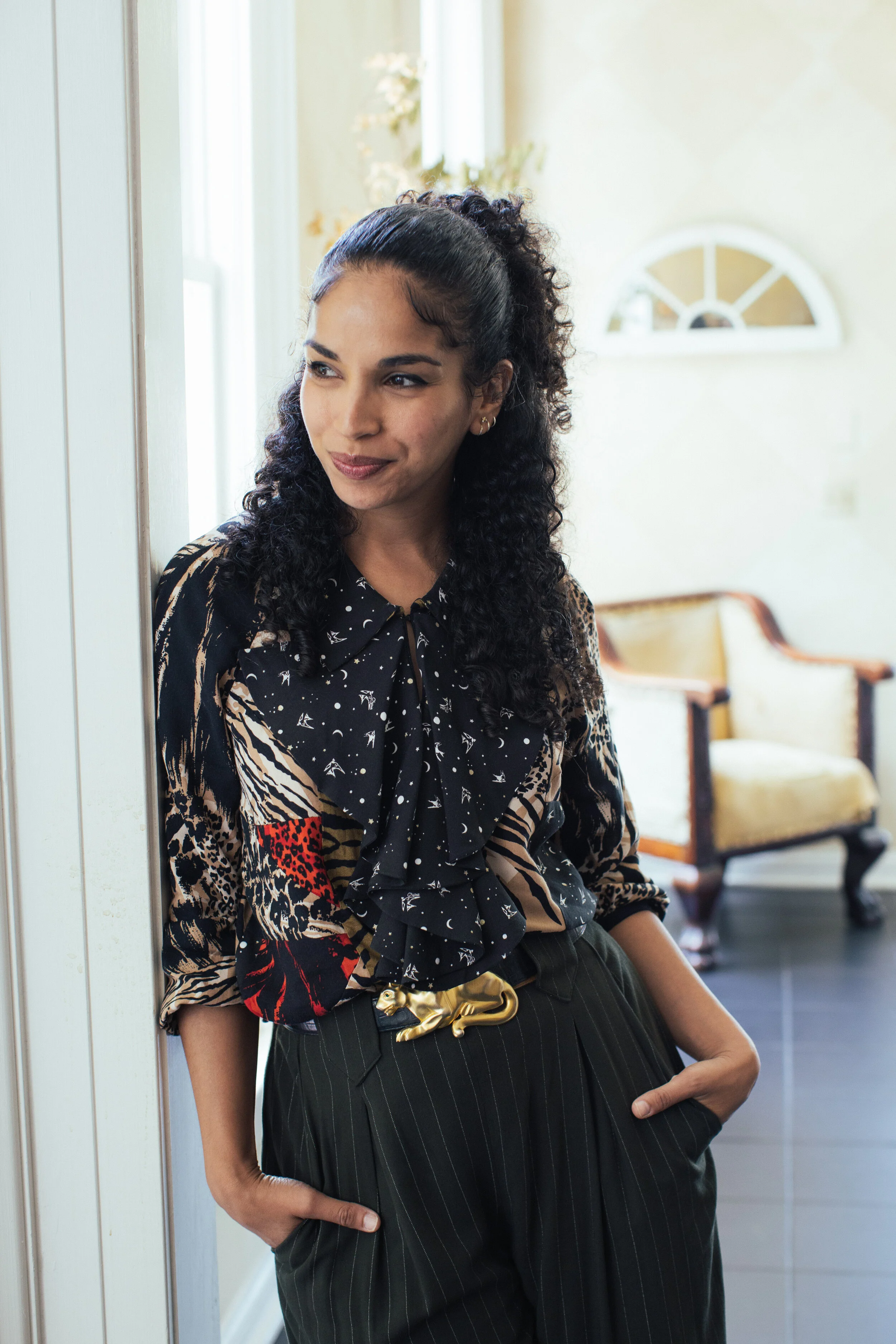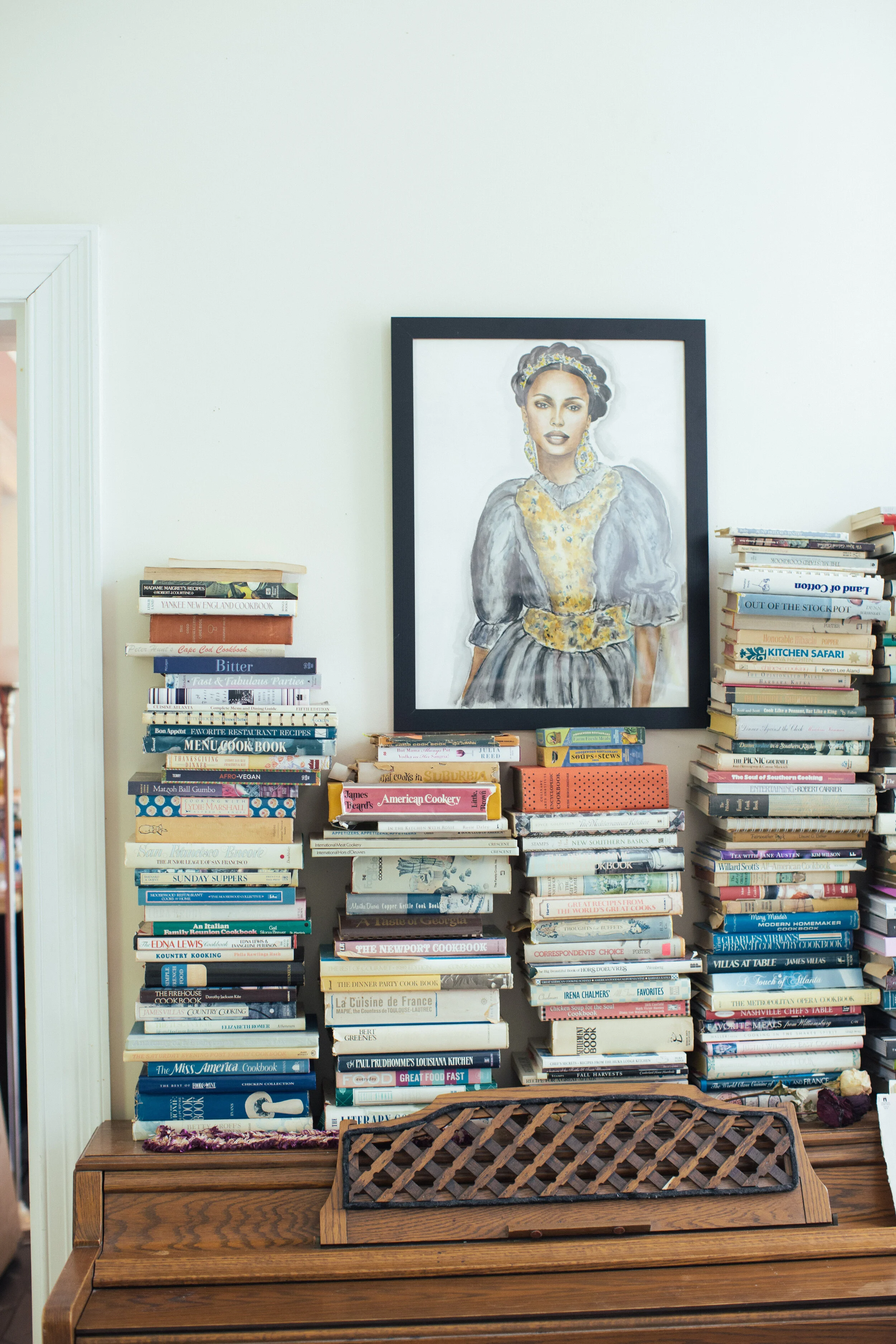Story By: Alexandra Bacchus
Photography: Daniel Meigs
Nashville Design Week 2019
Head to Head: Caroline Randall Williams
x Poni Silver
On a Saturday afternoon, over Bloody Marias and a well-mixed playlist, Maria “Poni” Silver and Caroline Randall Williams settled in for a conversation at Williams’ house about their art, their lives in Nashville, and their shared love of the stage.
Maria “Poni” Silver (left), Caroline Randall Williams (right), and Sebastian (seated)
Maria Silver is the founder and designer of her namesake label, Black by Maria Silver, which was the 2018 recipient of the Nashville Fashion Week’s Fashion Forward Fund. Caroline Randall Williams is an author, poet, and academic born and raised in Nashville. She is a writer in residence at Vanderbilt University and the author of Soul Food Love and Lucy Negro, Redux, a 2015 book that explores race, identity, and feminism through poetry and prose.Their unexpected connection came through production design with the Nashville Ballet—Silver as the costume designer for Seven Deadly Sins, and Caroline as the author of Lucy Negro, Redux, which was adapted into a ballet by TPAC last year.
On how they got involved with the Nashville Ballet.
Caroline–
It was so dreamy to think about my work being on the stage because I had written those poems with the stage in my mind. The poems themselves are very performative. . . . When Paul (Vasterling, the Creative Director of Nashville Ballet) came to my first reading after I agreed to work with the narrative of the book, he said, “I think you might have to be a part of the score.” And I thought to myself, duh. But also, I am delighted that I didn’t have to pitch myself! The joy of finding many ways into a creative life and having them all intersect honestly is an exciting thing.
Poni–
Paul Vasterling, [artistic director for the Nashville Ballet], had reached out to the Nashville Fashion Alliance looking for a costume designer, and [the NFA] put us together. I went in and interviewed with my portfolio and everything––and I hadn’t interviewed for something in a really long time! It turns out the Nashville Ballet uses the same costume design house that I used to work for in New York, so it all lined up. When I met with Christopher [Stuart, choreographer of the Nashville Ballet], he told me the vision, and I came up with several different aesthetics that I wanted the costumes to represent, and most of it was about the guilt you carry around with being Catholic. As for designing for movement, those are standard things I know from dancing. Asking myself if they can move and dance in something is so important.
On creating art with subtext.
Poni–
Everyone was wearing these nude jumpsuits in their own shade of nude, with your guilt floating around you shackled in different places, representing you carrying your guilt. It’s something you can’t escape, but because it’s the ballet, I still wanted it to look beautiful. At the end of the ballet, they took the sins off and just had their flesh-toned body suits. There were scars made through stitching all over the suits, and we had to keep adding more color because it got lost in the lighting and wasn’t registering to the audience. They all had black wigs because chopping women’s hair has historically been a way of shaming women.
Caroline–
I wish that they’d let you put a designer’s note in the program. Sometimes with a costume, it doesn’t cost the audience anything not to know the symbolism, but with yours in Seven Deadly Sins, it would have elevated my experience to know more. That knowledge is transformative to the experience of watching the ballet.
Poni–
But I also loved that they all looked really beautiful on their own without context.
Caroline–
But with the extra knowledge I would have been both struck and shook!
Poni–
Part of art is that it should speak for itself. A nerd like me wants to know every piece of the detail, but as long as people are enjoying it and grasp the general idea, at the end of the day . . . extra information is a bonus.
On the ways Nashville could continue to support their craft.
Poni–
I always wanted Nashville to have a co-op space because resources are difficult and machines are expensive. It would be cool if we could only need certain items individually but pay a monthly fee for the other things.
Caroline–
We were talking about Creative Mornings earlier, and I love that event because the people I met made me think a lot about interdisciplinary collaboration and facilitating conversation throughout the year. I would attend any and all gatherings of creative people coming together . . . something like a socializing series for people who don’t typically get out of their bubble so more collaboration can happen. That is my favorite thing. Also, Poni, I want to collaborate with clothes and words.
On the concept of art that nourishes the soul.
Poni–
What you leave the house in determines a lot of your mood. When I leave the house and I don’t look right or feel right, it really derails my day. I have to ask myself, is this what I’m trying to say to the world today? With my own designs, if I’m not going to wear it then I’m not going to put it out there for the world.
Caroline–
It’s funny, though, some people don’t feel that way about aesthetics. For some people, if it’s a shitty day, they just want to look like that . . . kind of like the people who wear sweatpants to the airport. It’s like that Oscar Wilde quote, “Either this wallpaper goes, or I must,” and then he dies because he hated the wallpaper. It’s life or death, the way that things look and nourish your spirit. The question is, does it sustain you? Food is private in some ways but not when you publish a book or have a dinner party. When I made these Bloody Marias, I wanted y’all to have some hot fire and see my style of it. . . . It speaks to that same impulse of looking right and feeling fresh. Soul food is called soul food because it’s soul-sustaining, and fashion is also soul-sustaining.
On what brought them to Nashville.
Poni–
It was an accident.
Caroline–
OK, keep going!
Poni–
I moved around when I was younger and was in LA before this. My band and I were on the road so much, and a friend of mine who was born and raised here, Kelly Williams (an amazing painter), suggested we come. We stayed for two months and thought, hey, this place is pretty rad. We went back on tour, came back, and just moved here because it was cheap to live. My plan was to move back to New York, but eleven years later, here we sit.
Caroline–
Because writing is my calling, I feel lucky that I get to be involved in Nashville Design Week because design is the rendering of the things I’ve imagined in concrete ways, which I don’t do as much. I teach, so the teaching is what pays the bills. But the poem-ing, I’m like, good luck if you don’t like it because . . . I’m going to write only exactly what I’m interested in writing. When I think about Nashville, having been raised here, this has always been a city with at least one genre of art. It’s a city that I’m excited about having as my hometown. We are a place where young artists can move and have access to intelligent, creative people. There’s this idea that if you build something, we will come to it, and no one is going to stop it.






